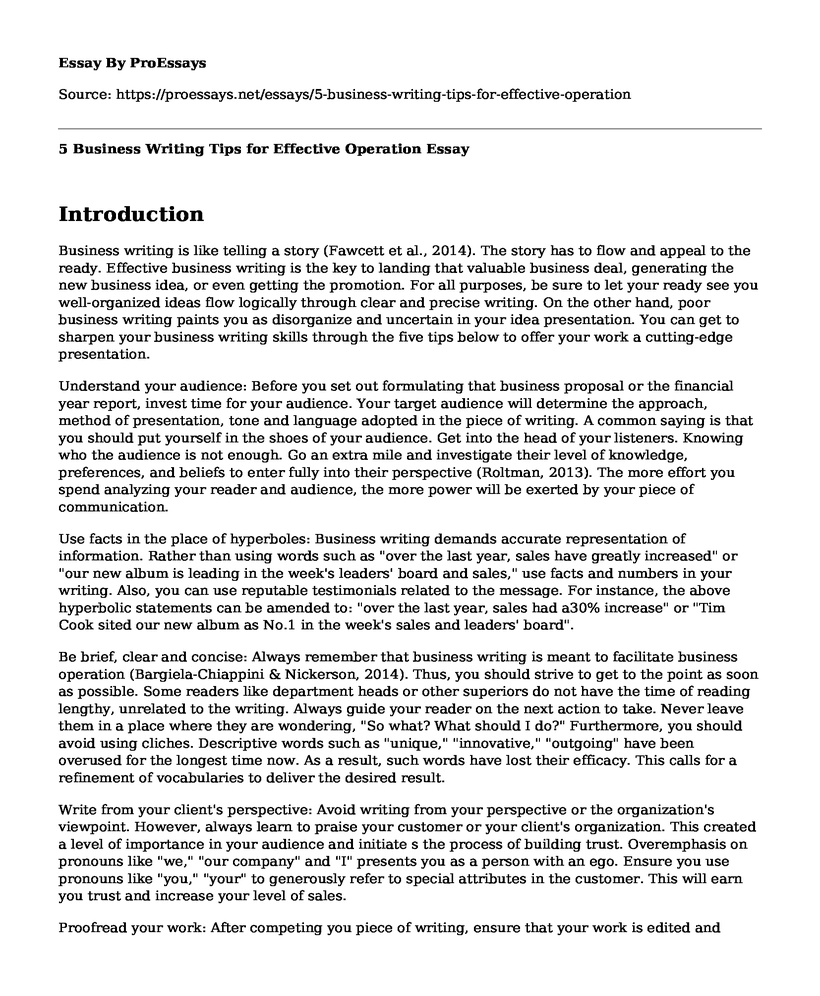Introduction
Business writing is like telling a story (Fawcett et al., 2014). The story has to flow and appeal to the ready. Effective business writing is the key to landing that valuable business deal, generating the new business idea, or even getting the promotion. For all purposes, be sure to let your ready see you well-organized ideas flow logically through clear and precise writing. On the other hand, poor business writing paints you as disorganize and uncertain in your idea presentation. You can get to sharpen your business writing skills through the five tips below to offer your work a cutting-edge presentation.
Understand your audience: Before you set out formulating that business proposal or the financial year report, invest time for your audience. Your target audience will determine the approach, method of presentation, tone and language adopted in the piece of writing. A common saying is that you should put yourself in the shoes of your audience. Get into the head of your listeners. Knowing who the audience is not enough. Go an extra mile and investigate their level of knowledge, preferences, and beliefs to enter fully into their perspective (Roltman, 2013). The more effort you spend analyzing your reader and audience, the more power will be exerted by your piece of communication.
Use facts in the place of hyperboles: Business writing demands accurate representation of information. Rather than using words such as "over the last year, sales have greatly increased" or "our new album is leading in the week's leaders' board and sales," use facts and numbers in your writing. Also, you can use reputable testimonials related to the message. For instance, the above hyperbolic statements can be amended to: "over the last year, sales had a30% increase" or "Tim Cook sited our new album as No.1 in the week's sales and leaders' board".
Be brief, clear and concise: Always remember that business writing is meant to facilitate business operation (Bargiela-Chiappini & Nickerson, 2014). Thus, you should strive to get to the point as soon as possible. Some readers like department heads or other superiors do not have the time of reading lengthy, unrelated to the writing. Always guide your reader on the next action to take. Never leave them in a place where they are wondering, "So what? What should I do?" Furthermore, you should avoid using cliches. Descriptive words such as "unique," "innovative," "outgoing" have been overused for the longest time now. As a result, such words have lost their efficacy. This calls for a refinement of vocabularies to deliver the desired result.
Write from your client's perspective: Avoid writing from your perspective or the organization's viewpoint. However, always learn to praise your customer or your client's organization. This created a level of importance in your audience and initiate s the process of building trust. Overemphasis on pronouns like "we," "our company" and "I" presents you as a person with an ego. Ensure you use pronouns like "you," "your" to generously refer to special attributes in the customer. This will earn you trust and increase your level of sales.
Proofread your work: After competing you piece of writing, ensure that your work is edited and proof-read. Presenting work with errors can taint your name. Also, numerical errors in business can have big implications. Proofreading is the only way that you will identify the errors. Some errors to look for include grammatical errors, formatting matters, style flaws, wordiness, missing information or illogical gaps (Booher, 2015). Additionally, try reading your final draft loudly. In case something does not sound formal or awkward, the loud reading will help you identify the error. For instance, you might have written "profits and loses" when you intended to write "profits and losses."
Conclusion
Business writing is a critical element. The true refined art of writing in adherence to the above tips can only be achieved through persistent writing and application of the tips. With time, you will develop an authoritative approach to your documents and pieces of writing and gain a greater command of words.
References
Bargiela-Chiappini, F., & Nickerson, C. (Eds.). (2014). Writing business: genres, media, and discourses. New York: Routledge.
Booher, D. (2015, March 18). The top 5 business writing mistakes. HuffPost. Retrieved from https://www.huffingtonpost.com/dianna-booher/the-top-5-business-writin_b_6884148.html
Fawcett, S. E., Waller, M. A., Miller, J., Shwieterman, M., Hazen, B. T., & Overstreet, R. E. (2014). A trail guide to publishing success: tips on writing influential conceptual, qualitative, and survey research. Journal of Business Logistics, 35(1), 1-16.
Roltman, D. (2013, July 16). 5 business writing tips to make the readers hang on your every word. HuffPost. Retrieved from https://www.huffingtonpost.com/dan-roitman/5-business-writing-tips-t_b_3600479.html
Cite this page
5 Business Writing Tips for Effective Operation. (2022, Apr 12). Retrieved from https://proessays.net/essays/5-business-writing-tips-for-effective-operation
If you are the original author of this essay and no longer wish to have it published on the ProEssays website, please click below to request its removal:
- Report Sample on Peculiarities of Doing Business in Turkey
- Paper Example on Entrepreneurship
- Service Delivery System (SDS) and Customer Experience Analysis (CEA) Paper Example
- Entrepreneurship Overview: Intention & Beyond - Essay Sample
- Essay Sample on Maintaining Professionalism: Meeting Objectives Through Ethical Standards
- ICTs in Hospitality: Hotel Reservation, Billings, and Accounting - Essay Sample
- Essay Example on Small Biz Owner v. Entrepreneur: Who's Who?







